

Financial model of an agricultural farm engaged in the production of cereals, fodder, and milk
Agricultural farms are an industry that requires precise planning and management of data, costs, and resources to achieve success. Unlike other industries, agricultural processes are closely tied to nature and require strict monitoring. Data management plays a key role in this process, as farms must monitor and analyze all information such as: weather conditions, soil quality, crops, livestock breeding, sales results, and financial results.
Planning enables farm owners to better control costs, which is extremely important to avoid excessive expenses and improve profitability.
Implementation 2022
We provide a financial model that fulfills the following functions:
- liquidity management of the company
- company budgeting and serving as a source of information for developing financial strategy
- assessment of the overall business potential, including measurement of its utilization and identification of key risk factors
- comprehensive financial modeling of all business areas
- enterprise valuation
The financial model includes the following main data sets:
- salaries – broken down by type of contract, employment period, salary amount, business line
- energy consumption – taking into account seasonal trends, adjusted by business line
- machinery fleet – including machine usage, average operation costs, and insurance
- record of fixed assets
- other fixed and variable costs not related to crop or livestock production
- financial liabilities – including capital repayment schedules, interest calculation methodologies, interest rates, and fees
FINANCIAL MODEL – FINANCIAL LIABILITIES
Investment Loan Visualization
Each liability has its own visualization along with a summary covering the forecast period and the remaining principal to be repaid.
The financial model enables the projection of interest costs when introducing changes to WIBOR.
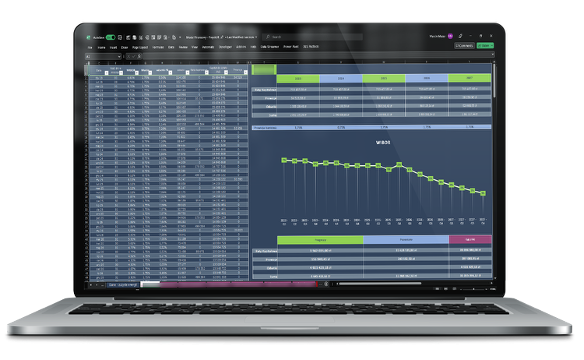
The credit and leasing management module in the company’s financial module brings several benefits, including:
- Easier management of financial liabilities – the tool enables monitoring of repayment schedules, payment deadlines, interest, commissions, and other costs associated with a loan or lease.
- Faster decision-making – data visualization makes it easier to quickly understand the financial situation related to a loan or lease, enabling quicker business decisions.
- Increased efficiency and control over expenditures – the tool allows better planning and management of financial liabilities, which leads to greater control over company spending and cost savings.
FINANCIAL MODELING – MARKET TRENDS
Market trends
Simulation and financial forecasting functionality includes parameter changes over time such as:
- diesel fuel cost
- electricity and gas prices
- WIBOR rates and inflation
- milk prices
- diesel prices
- electricity prices
- natural gas
- WIBOR rates
- inflation value
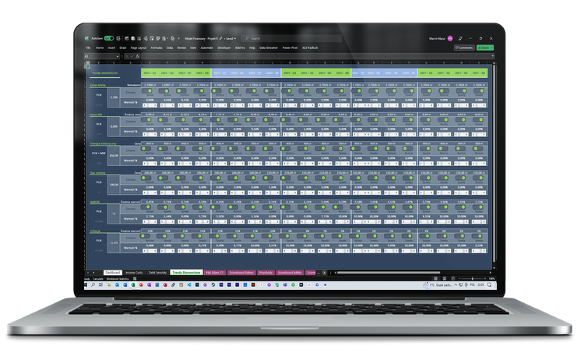
Analysis of the impact of changes in the WIBOR rate on the financial condition of the enterprise.
By entering the appropriate parameters, you can visually see, among other things, how the cash position in Cash Flow will look.</
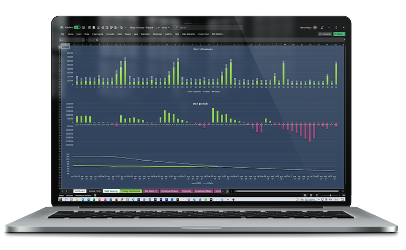
The market trends module allows for simulations that indicate the potential consequences of a decrease in milk prices for an agricultural enterprise. This simulation covers the determination of break-even thresholds, meaning you can establish the minimum price per liter of milk needed for the enterprise to generate profits, cover production costs, or incur losses.
Model finansowy uwzględnia następujące źródła danych do realizacji modelowania finansowego upraw rolnych:
1. Edytowalna lista ponad 150 czynności rolnych dla dziesięciu różnych upraw uwzględniając:
- termin realizacji czynności
- zapotrzebowania na ilość oleju napędowego
- zapotrzebowanie na ilość materiału jak nawozy czy środki ochrony roślin
- możliwości nieuwzględniania czynności w prognozie jak np. wapnowanie
- Możliwość realizacji czynności w modelu outsourcingu
2. Modyfikowalne zbiory danych w zakresie kosztów wszystkich materiałów koniecznych do realizacji upraw rolnych
Crop Production Planning
To perform the calculation, only the following need to be filled out:
- number of hectares allocated for a specific crop in a given season
- forecasted grain price
- yield estimation
- indication of the percentage share allocated for fodder
Calculates margin per ton and indicates break-even thresholds
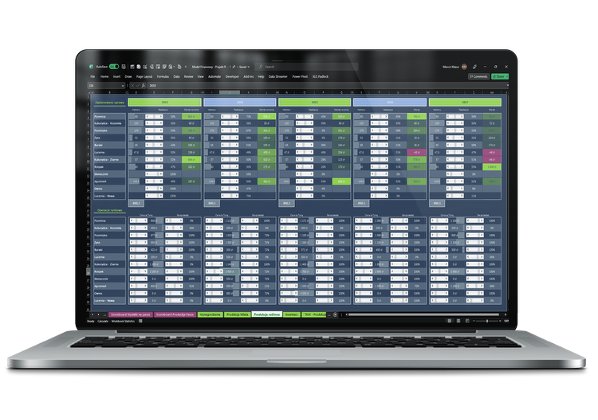
Technical costs of producing specific crops
The dashboard displays all indirect and direct costs related to crop production, divided into strictly defined categories.
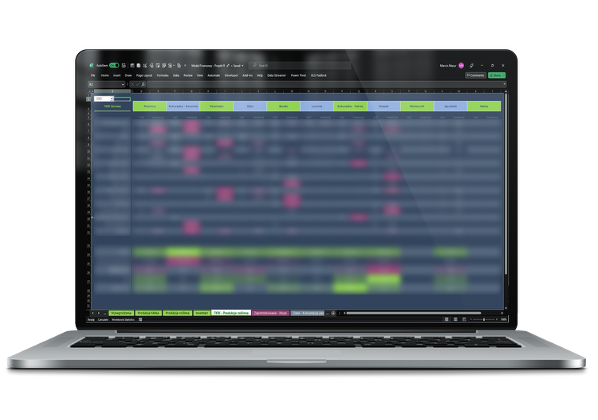
DATA SOURCES FOR THE LIVESTOCK PRODUCTION MODULE
This financial model takes into account the following data sources for modeling and requires the user to specify only:
- herd size with consideration of eight categories. The financial model enables analysis of herd reduction and its impact on the financial condition.
- completion of the feed recipe
Other costs related to livestock as well as planned energy costs and diesel fuel requirements are derived from financial analysis and other applications.
Analysis of (Technical Cost of Milk Production)
Technical cost of milk production
Along with calculating milk production costs, the model allows analysis of how increases or decreases in milk production affect the company’s financial results and liquidity.
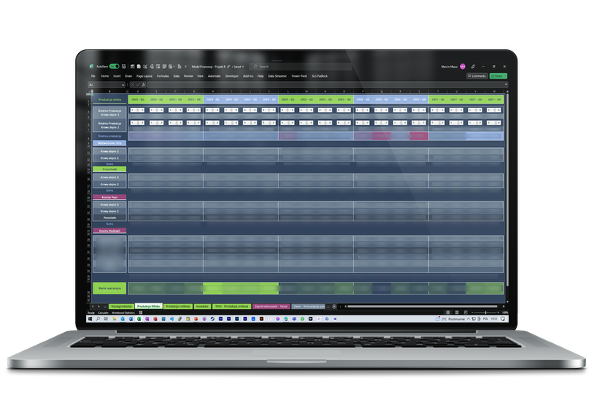
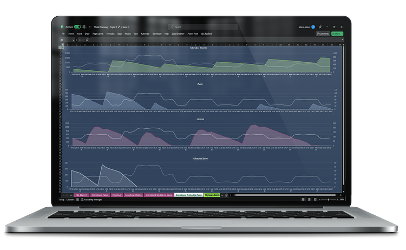
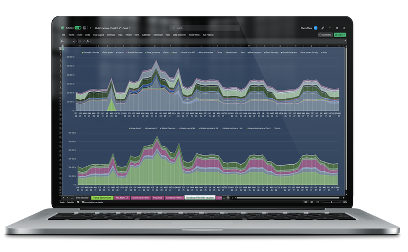
P&L, Balance Sheet, and Cash Flow
Fundamentals of the accounting reporting system. Uses all data calculated in the financial model.
The primary goal is to present financial forecasts for banking institutions.
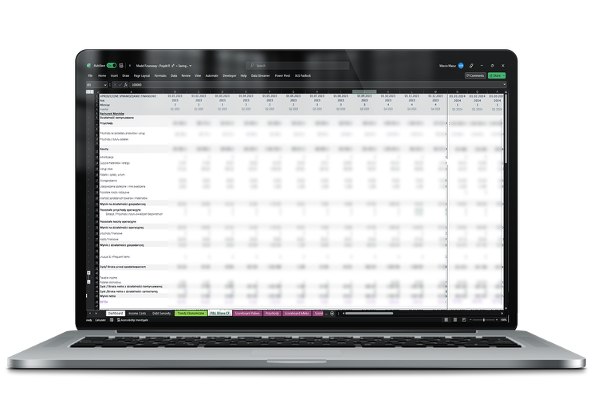
FINANCIAL MODEL – FINANCIAL DASHBOARD
Financial liquidity visualization.
Contains basic accounting and financial information broken down by business line.
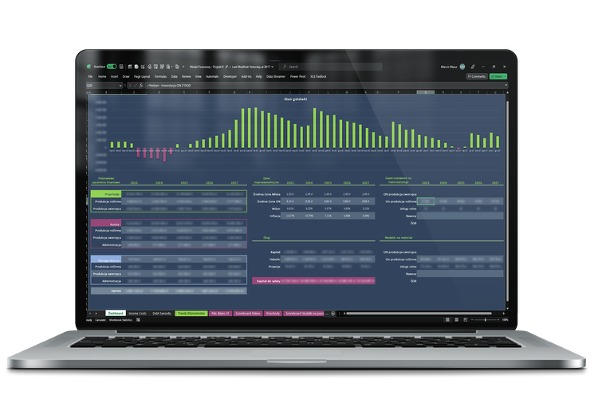
Key Benefits
Enables accurate tracking of costs and revenue:
The financial model allows for analysis and forecasting of costs and revenues related to agricultural production.
Facilitates production planning:
The financial model takes into account many factors affecting agricultural production, such as fertilizer and feed prices, loan rates, etc. This enables better production planning and increased efficiency.
Allows for result comparisons
With the financial model, you can compare financial results with previous periods or with other farms. This leads to better market and competition understanding, enabling more profitable decision-making.
Makes risk management easier
The financial model allows analysis and forecasting of risks associated with agricultural production, such as adverse weather conditions, rising feed prices, or herd diseases. This makes it possible to protect against financial losses.
Enables better resource utilization
Through cost and efficiency analysis of individual activities, the financial model allows for improved utilization of resources—such as land, machinery, and labor. This increases the profitability of agricultural production.
Enables quick response to market changes
The financial model enables real-time monitoring of market changes and rapid response. This helps the farm owner adapt production to changing conditions and maximize profits.
